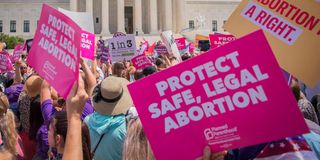Provide survivors of sexual violence with safe abortion care

Pro-life abortion protest in the US in this file photo. Local SRHR experts want the Kenyan government to acknowledge that survivors of sexual violence in need of, and qualify for safe abortion, should receive the service at the nearest possible health facility.
In June 2019, the High Court delivered a landmark judgement in a case involving an adolescent (then aged 14) identified as JMM, who had become pregnant as a result of defilement and sought an abortion.
JMM developed various complications from the abortion including sepsis and eventually kidney failure that finally resulted in her death in 2018, four years after she had sought the abortion.
The five-judge bench ruled that JMM had the right to safe abortion care and found the Ministry of Health culpable of violating her rights by unlawfully withdrawing the standards and guidelines for reducing morbidity and mortality from unsafe abortion in Kenya.
Despite the progressive court pronouncement, there continues to be covert and overt attempts to deny survivors of sexual violence like JMM, and other women and girls within the constitutional provisions, the right to safe abortion care.
Safe abortion
This is manifested through outright lack of implementation of the court orders by the Ministry of Health to accelerate use of the standards and guidelines for training healthcare providers-including nurses, clinical officers, and midwives-on offering safe abortion to survivors of sexual violence, and other women and girls within the constitutional provisions, without fearing criminal sanctions.
JMM’s case brought to light the plight of many survivors of sexual violence who have no place to turn, and no access to information or reproductive health services. A toll-free line by the Federation of Women Lawyers (Fida) Kenya, since the onset of Covid-19 pandemic in March 2020 reported 345 cases of defilement, 189 cases of rape, six cases of incest and 23 cases of attempted rape.
According to the national gender-based violence hotline “1195” run by Healthcare Assistance Kenya and the Ministry of Public Service and Gender, there was a staggering 301 per cent increase in calls reporting sexual violence in March and April 2020 alone.
In July 2020, a proclamation by then President Uhuru Kenyatta acknowledged the huge increase in violence against women and girls, including rape, across Kenya. In August 2020, an NTV investigation found that more than 200 cases of rape involving children were reported in a single informal settlement in Nairobi.
A report by Human Rights Watch revealed that violence against women, an ongoing problem, further increased during the pandemic. And the United Nations Entity for Gender Equality and the Empowerment of Women (UN Women) is on record terming the violence against women and girls since the outbreak of Covid-19 as a “shadow pandemic”.
Failure by the Ministry of Health to implement the court orders to accelerate use of the standards and guidelines has had a chilling effect among healthcare professionals since some of them remain hesitant to offer safe abortion to survivors of sexual violence for fear of criminal sanctions.
Moreover, the hesitation by the Ministry of Health to provide trained health professionals, essential medicines, and equipment for safe abortion in all public health facilities, disenfranchises survivors of sexual violence, and other women and girls within the constitutional provisions, who ultimately opt for unsafe abortion.
In 2003, the African Union adopted The Maputo Protocol to uphold equal rights for girls and women. The Government of Kenya must unequivocally create an enabling environment for women and girls including survivors of sexual violence and healthcare providers to seek and offer safe abortion without perpetual fear of arbitrary arrests and prosecutions.
It must be deliberate in ensuring all public health facilities have trained health professionals, essential medicines, and equipment for safe abortion care. The government must accelerate the rolling out of the standards and guidelines for training healthcare providers on offering safe abortion care to survivors of sexual violence.
It must also resume the proactive dissemination of accurate information on abortion care especially to survivors of sexual violence on how and where to access safe abortion.
Enid Muthoni is the Chief Programme Officer at Center for Reproductive Rights




